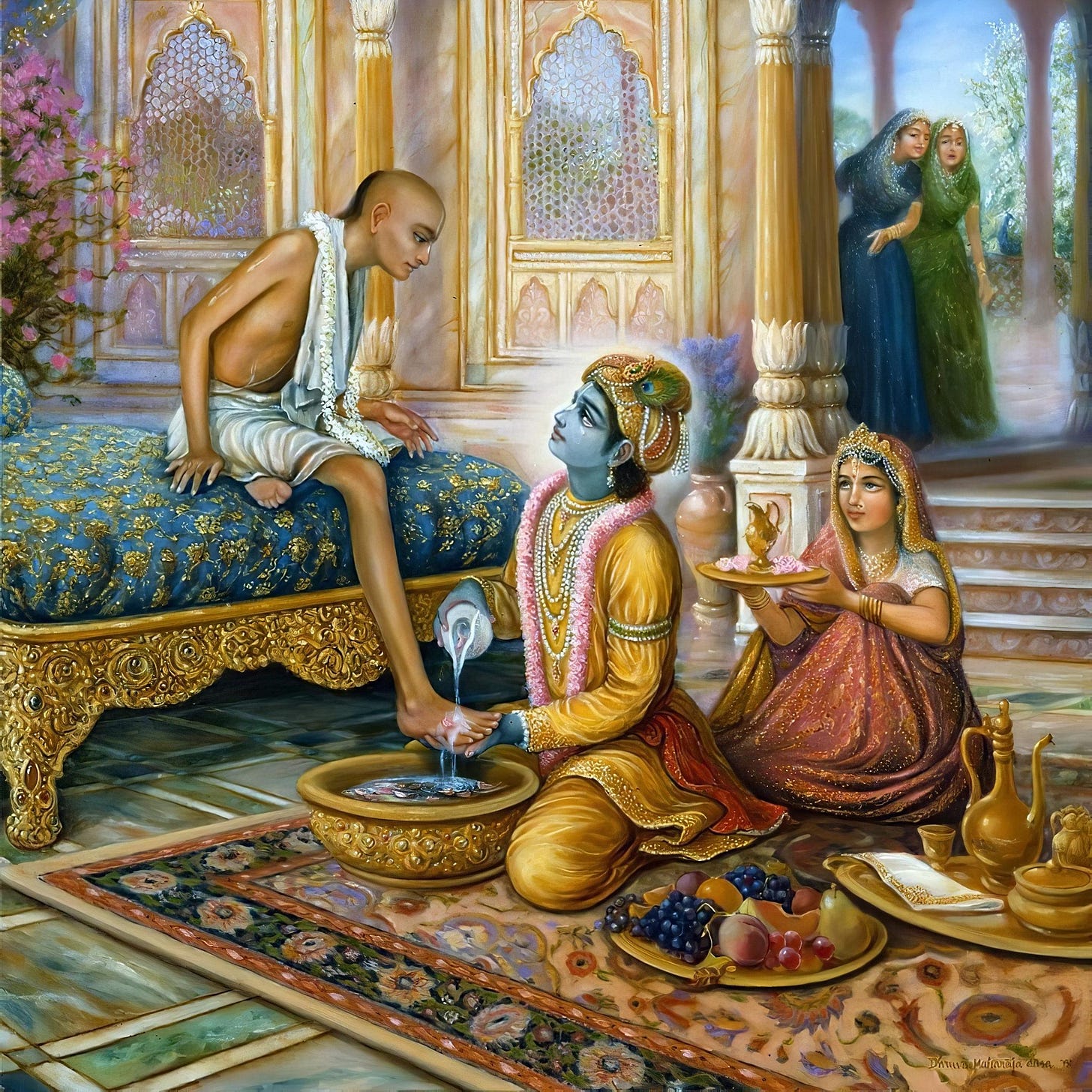Bhṛgu realizes the mano-maya (Taittiriya Upanisad 3.4)
When one realizes prāṇa, he has the impression that prāṇa is the real being, because at the time of death, prāṇa carries the subtle body to the next body, just like a plane carrying passengers.
Section 4: Bhṛgu realizes the mano-maya
When one realizes prāṇa, he has the impression that prāṇa is the real being, because at the time of death, prāṇa carries the subtle body to the next body, just like a plane carrying passengers. One who has insufficient knowledge or vision may see only the plane and not the people inside it. In a higher stage of understanding, however, one may understand that the consciousness is in the subtle body, which is transported by the vital air. The subtle body is composed of mind, intelligence, and false-ego, and thus the realization of consciousness as the source of all beings starts from realizing the mind. The mind in turn originates from the Supreme Brahman, and therefore the Lord is everything.
Text 3.4.1
mano brahmeti vyajānāt
manaso hyeva khalvimāni bhūtāni jāyante, manasā jātāni jīvanti
manaḥ prayantyabhisamviśantīti
tadvijñāya punareva varuṇam pitaramupasasāra
adhīhi bhagavo brahmeti
tam hovāca
tapasā brahma vijijñāsasva, tapo brahmeti
sa tapo’atapyata, sa tapas taptvā
By practicing austerities he realized Brahman in the mind. From the mind, all beings arise, by the mind they live and they finally enter into the mind at death. Understanding this, he again inquired from his father: "Please teach me more about Brahman." The father answered: "Search for Brahman in austerity. This austerity is Brahman." Bhṛgu again practiced austerities and further increased his spiritual realization.
Commentary: In conditioned life, material intelligence works to satisfy the desires of the mind, and thus both are frequently amalgamated in different examples and allegories mentioned in the scriptures. In the allegory of King Purañjana (mentioned in the 4th canto of Srimad Bhagavatam), for example, mind and intelligence are amalgamated into the figure of the Queen. Identifying with her, Purañjana would helplessly follow all her steps, just like a conditioned soul follows the dictations of the mind and intelligence:
"When the Queen drank liquor, King Purañjana also engaged in drinking. When the Queen dined, he used to dine with her, and when she chewed, King Purañjana used to chew along with her. When the Queen sang, he also sang. Similarly, when the Queen cried, he also cried, and when the Queen laughed, he also laughed. When the Queen talked loosely, he also talked loosely, and when the Queen walked, the King walked behind her. When the Queen would stand still, the King would also stand still, and when the Queen would lie down in bed, he would also follow and lie down with her. When the Queen sat, he would also sit, and when the Queen heard something, he would follow her to hear the same thing. When the Queen saw something, the King would also look at it, and when the Queen smelled something, the King would follow her to smell the same thing. When the Queen touched something, the King would also touch it, and when the dear Queen was lamenting, the poor King also had to follow her in lamentation. In the same way, when the Queen felt enjoyment, he also enjoyed, and when the Queen was satisfied, the King also felt satisfaction." (SB 4.25.57-61)
When one realizes prāṇa, he has the impression that prāṇa is the real being, because at the time of death, prāṇa carries the subtle body to the next body, just like a plane carrying passengers. One who has insufficient knowledge or vision may see only the plane and not the people inside it. In a higher stage of understanding, however, one may understand that the consciousness is in reality included in the subtle body, the combination of ego, mind, intelligence, desires, subtle senses, and so on, which is transported by the vital air.
All the creatures we see roaming around the earth can exist only in the presence of the soul, whose only visible symptom is consciousness, which goes from one body to the next with the assistance of the subtle body and vital air, under the sanction of the Supersoul. The body remains alive only as long as the consciousness of the soul permeates it, and at the time of death, the consciousness withdraws into the subtle body and is carried by it to the next body.



